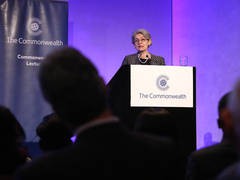
GCED Basic Search Form
Quick Search
Close
You are here
News
In Commonwealth Lecture, a call to educate for inclusion, dialogue and peace
Post date:
2016/03/03

A community of 53 countries harbouring a quarter of the world’s population – of which 60% are under 25 – she affirmed that “UNESCO and the Commonwealth are guided by similar principles of dialogue, tolerance, respect and understanding, cooperation and joint action.” She noted the scope of UNESCO’s cooperation with the Commonwealth, spanning teachers, technical and vocational education and training, higher education, ICTs, as well as Open Educational Resources.
From combating violent extremism to connecting the dots between the social, economic and environmental dimensions of sustainable development, Ms Bokova affirmed that there is no more powerful force than education, to advance social inclusion, break the vicious circle of poverty and hold up human rights.
“Lasting peace and sustainable development are unthinkable while exclusion and deep inequality persist,” she warned.
She opened on the Syria crisis and the risk of losing a generation to despair, poverty and violence, asserting that “education cannot wait – it must be a priority from the top, in disaster risk reduction, in humanitarian action, in peacebuilding – because there is no stronger foundation for reconstruction and recovery, for lasting peace.” This crisis, she said, highlights the wider challenge of building more just and inclusive societies, in what she described as a “global struggle for hearts and minds.”
“Education is the way to disarm the processes that may lead to violent extremism, by undermining prejudice, by fighting ignorance and indifference,” she said, citing UNESCO’s actions to engage youth in strengthening the narrative of a single humanity and empowering them as agents of change.
Noting that inclusion lies at the core of the 2030 Agenda for Sustainable Development, she outlined UNESCO’s leadership in shaping a comprehensive and holistic vision of education, and its work with Governments to build more inclusive education systems and schools that are “crucibles of tolerance and solidarity.” She emphasized that the promotion of gender equality, a global priority for UNESCO, is the foundation for dignity and the catalytic force for development, citing UNESCO’s cooperation in several Commonwealth countries, including Bangladesh and Pakistan.
Today’s challenges call for new ways of seeing the world, of thinking and behaving – and this starts with education. “Given the depth of transformation affecting all societies, I am convinced we need to think big again today about education, to make the most of its transformational force for equity and inclusion, for global solidarity,” said the Director-General, stressing that global citizenship education is a priority for UNESCO.
“This is about learning to live in a world under pressure, about new forms of cultural literacy, about sharing the wealth of cultural and linguistic diversity as a force for renewal, belonging and innovation.”
She highlighted the work of the Mahatma Gandhi Institute of Education for Peace and Sustainable Development based in New Delhi, which promotes youth action for transformative learning and social change, including through its YESPeace Network.
Irina Bokova also underlined the importance of Education for Sustainable Development, including to take forward the Paris Climate Change Agreement. Noting that the Commonwealth counts a large number of Small Island Developing States, she listed UNESCO’s work to strengthen disaster preparedness through teacher training, safe school facilities and climate change education.
Reacting to the lecture, the Chair of the session, Lord John Alderdice, renown for his lifetime work on conflict resolution and peace building, praised the focus placed on values. “We tend to speak about education in instrumental terms. This brought us back to its fundamental purpose, which is about values, dialogue and peace – the human dimension.
Concluding the event, the Secretary-General of the Commonwealth of Nations, Mr Kamalesh Sharma, affirmed that “investing in young people is essential for securing a peaceful future. UNESCO and the Commonwealth are committed to dialogue and knowledge sharing as the pathway to sustainable development and mutual understanding. ” He outlined plans to reinforce collaboration in the areas of education, youth, peace-building and dialogue, stating that this commitment takes on heightened importance in the context of violent extremism.
URL:
http://www.unesco.org/new/en/media-services/single-view/news/in_commonwealth_lecture_a_call_to_educate_for_inclusion_dialogue_and_peace/#.VteDsPmLSUk
